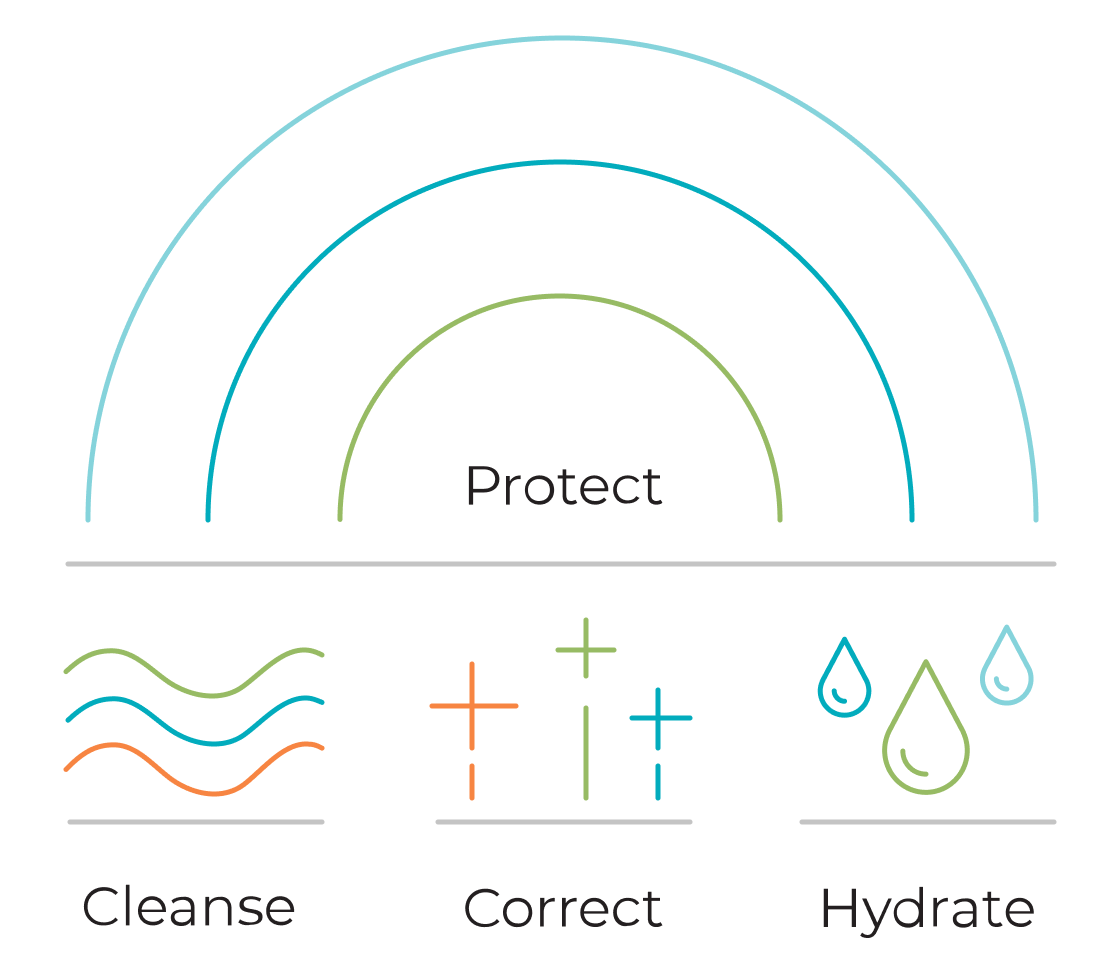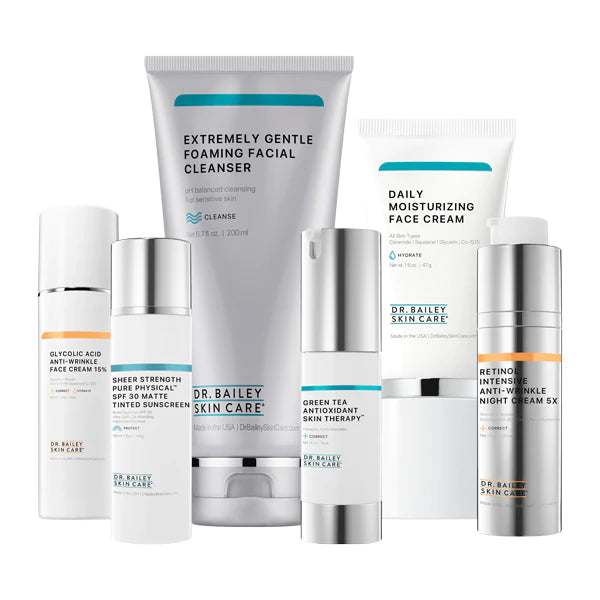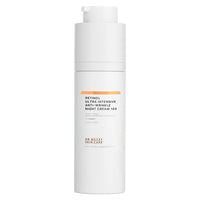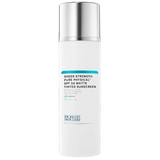Tretinoin, often known by its brand name Retin-A, is a dermatologist-favored powerhouse for combatting skin aging. But navigating its application and layering with other skincare products can be confusing. Fear not! This comprehensive guide, informed by my expertise as a dermatologist with 35+ years of experience, will unlock the secrets to the transformative skincare potential that helps your skin tolerate tretinoin and fend off wrinkles.
Let’s demystify tretinoin once and for all. You will learn key dermatologist tested practical tips about how to apply tretinoin and how to layer it – do you put it on before or after a moisturizer, and how to use it with other skincare products. Then we’ll break down how to create your optimal tretinoin skin care routine, set up your nighttime tretinoin regimen, how to use it based on your complexion, look at alternatives, and the best products to maximize the age defying benefits of using tretinoin. I even included some educational content beyond the basics to help you better understand tretinoin and its use.
Imagine… soothed skin, minimized pores, and a healthy, radiant, youthful glowing skin.
Before You Start Using Tretinoin (Retin-A)
Before we dive into how to use tretinoin, it’s important that you are aware of a few key basics:
- Tretinoin is a prescription medication used for acne, aging, and pigmentation. How you use this medicine is ultimately the responsibility of your prescribing doctor. The information presented here discusses how I have used tretinoin in my practice. Please discuss these approaches with your prescribing physician.
- Retin A can react with other skin care products causing redness, itchiness, and dry skin.
- It can cause irritation, dryness, and sun sensitivity especially in the beginning months of introducing it into your skincare routine.
- Tretinoin is not a moisturizer. Although it contains a moisturizing base, tretinoin can be irritating on damp skin. Always prioritize a dedicated moisturizer for optimal hydration.
- All of the tretinoin benefits have excellent scientific proof.
- Retinol, just like tretinoin, is a retinoid. Retinol is a well-known and less irritating non-prescription option similar to tretinoin. Medical-grade retinol products share the same proven benefits as tretinoin when used at the highest available retinol concentration.
Every dermatologist I know considers retinoids the single most important skin care ingredient, along with sunscreen, to fight skin aging. In fact, we all use a retinoid in our personal skin care routines.
How to Apply Tretinoin Cream
Let’s learn how to use tretinoin for maximum results, including when to use it and smart layering techniques that help tackle wrinkles, uneven tone, and dullness.
Apply Tretinoin at Night
Apply retinoids, like tretinoin and retinol, at night. Retinoids, like tretinoin and retinol are deactivated when exposed to light so it’s best to put them on right before you turn out your light to go to sleep.
Always Apply It to Dry Skin
Dry skin is key. Yes, tretinoin is in a moisturizing base, but because it causes irritation if applied to damp skin, it can’t be your moisturizer! This is not true of retinol but because of these particular tretinoin ‘issues’, I share the steps of my nighttime skin care regimen for tretinoin users further below.
Do You Apply Tretinoin Before or After a Moisturizer
Moisturizer first, wait, then tretinoin: Apply your moisturizer, wait at least 15 minutes to allow it to absorb, and then proceed with tretinoin to avoid irritation. Then it’s ‘lights out’. Follow the tretinoin skincare routine steps below in this guide to build a regimen that will work for your complexion.
I always recommend that patients layer their products from thin to thicker, or water-based to more oil-based, for best effectiveness. – Dermatologist Dr. Bailey
How Long Should You Wait to Apply a Moisturizer
Some individuals, especially those with sensitive skin, benefit from a 15 to 30 minute wait after cleansing before applying tretinoin. The 15+ minute wait allows the skin barrier to recover and minimizes irritation. This helps reduce the risk of tretinoin induced retinoid dermatitis, a common issue for many tretinoin users.
Additional Application Tips
- Wash your face and hands before applying any products.
- Start slow: Begin with applying tretinoin 2-3 nights per week, gradually increasing frequency as tolerated. This approach is also good to follow if you are introducing retinol instead of tretinoin.
- Use only a pea-sized amount for your face. More can be irritating. Dot it on key areas and spread evenly. If you are using it on your neck and chest, each gets another pea-size dollop. Know that tretinoin can irritate neck and chest skin so consult your prescribing physician.
- Be careful about mixing tretinoin with skin products that contain vitamin C, benzoyl peroxide or salicylic acid. Learn more about this below.
- Use sunscreen daily. Tretinoin increases sun sensitivity.
- Listen to your skin. Adjust your routine based on any irritation or dryness.
- Consult your dermatologist for professional guidance on personalized advice and concerns.
Tretinoin Skincare Routine
Over the decades I’ve created customized, complex layered tretinoin skincare routines for my patients and I’ve seen the results of the success and challenges of many in my practice and on my own face. I’ve learned what works and where people get into trouble.
The secret to creating a powerful and complexion transforming skin care routine is to build what I call a Complete Skin Care Routine. It gives the skin everything it needs in the 4 essential steps: Cleanse, Correct, Hydrate, Protect.
Here is your guide to building a skincare routine with the steps to successfully layer tretinoin (or retinol). Look for the section where we discuss specific considerations and options you should follow based on your complexion.
How to Layer Tretinoin with Other Products
Application timing and product combinations can make or break the results. Often you won’t know things aren’t working for weeks or months. It’s why I’m so specific about the products and tretinoin skin care regimens I recommend.
I cover each of these key steps in more detail further below:
- Choose the right products to use and layer with tretinoin
- Follow the nighttime skincare routine below
- Customize your routine based on my recommendations in the complexion based layering options section of this guide
The Best Products to Use with Tretinoin
I designed the following two skincare kits to support tretinoin use. Below them, I describe how to layer a routine.
Both kits include anti-inflammatory green tea cream to soothe tretinoin skin irritation, a gentle non-drying cleanser, a deeply hydrating moisturizer, and non-irritating sunscreen, all of which help to enable tretinoin success.
- Complete Facial Skin Care Kit: Ideal for layering with tretinoin.
- It comes with a gentle facial cleanser, moisturizer, green tea antioxidant therapy, and matte tinted sunscreen.
- Ageless Rejuvenation Skin Care Kit: Perfect for alternating tretinoin with a gentler option, retinol.
- This kit includes all the products from the Complete Facial Skin Care Kit, plus two additional powerful anti-aging creams:
- A Retinol Night Cream that offers similar benefits to tretinoin but with less irritation, allowing you to alternate with tretinoin or use it in its place when tretinoin is too strong. It also includes Glycolic Acid Cream for wrinkle and sunspots control.
I use all of these products for my own routine to keep my skin as healthy and glowing as I can. I alternate my Retinol Cream with tretinoin because it is easier to use.
See the below sections on complexion based routine options and more on alternating tretinoin with retinol.
Nighttime Routine:
Nighttime application is key. Tretinoin is light-sensitive and breaks down in sunlight, so apply it right before turning off the lights to avoid light exposure.
1. Cleanse
Wash your face with warm water and the gentle pH balanced Extremely Gentle Cleanser, which cleans skin well without irritating or over-drying.
Rinse really well to remove makeup, dirt, pollution and product residue so that your bedtime products will penetrate well while you sleep.
2. Correct + Hydrate
The core steps when using tretinoin are listed below, however please see the layering options explained under these steps to build your specific steps:
- Ensure your skin is completely dry
- Apply Green Tea Antioxidant Skin Therapy
- Follow with Daily Moisturizing Face Cream
- Wait at least 15 or 30 minutes
- Apply tretinoin
- Turn off lights and go to sleep
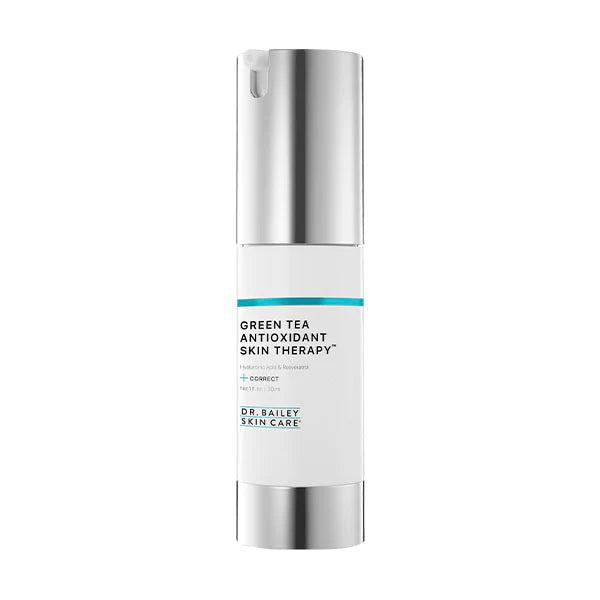
Complexion Based Layering Options
Customized routines understand the variations based on individual needs and tolerance.
There are 4 bedtime layering options for the Correct and Hydrate steps in a skincare routine depending on your unique complexion, products used, and skin’s tolerance because glycolic acid and retinoids can cause irritation.
Choose the option that best suits your skin’s tolerance:
- When using Tretinoin: Apply Green Tea Cream, follow with Daily Face Cream, wait 15+ minutes or more, then apply tretinoin
- When using Retinol: Apply Retinol Anti-Wrinkle Night Cream directly after cleansing, followed by Daily Moisturizing Face Cream
- If you can tolerate Retinol + Glycolic Acid simultaneously: Apply Retinol Night Cream, followed by Glycolic Acid Face Cream
- Complexions that can tolerate Tretinoin + Glycolic Acid: Apply Green Tea Cream, followed by Glycolic Acid Cream, wait 15+ minutes, then apply tretinoin (requires your doctor’s approval)
In building a routine I also use common sense and the principle of applying water-based (thin) products first followed by oil/occlusive (thicker and more viscous) products on top. This will help product ingredients diffuse into the skin.
Alternating Tretinoin with Retinol
A non-prescription product similar to tretinoin with proven benefits
Tretinoin is a retinoid. Retinol is in the same family, also has good scientific evidence for the same skin benefits, and is the best retinoid that is available without prescription.
- Retinol is converted to retinoic acid in your skin (which is what tretinoin is).
- Retinol is less irritating than tretinoin.
- The Retinol Cream contains the same high concentration green tea antioxidants and so it is a two-fer. This means that when using the Retinol Cream, there is no need to apply Green Tea.
- Conversely, some people with really tolerant complexions may combine Retinol (or even tretinoin) and Glycolic Acid Cream together.
Your skincare routine is important for fighting skin aging. Tretinoin and retinol are powerhouse ingredients with proven results. Training your skin to tolerate one or both of these retinoids is worth the effort! Learn more about building your skin’s tolerance below.
Your Kit for Alternating Tretinoin and Retinol
I created my Ageless Rejuvenation Skin Care Kit to help give people confidence with layering tretinoin into an even more powerful state-of-the-art anti-aging skin care routine. It includes my Retinol Night Cream to alternate with tretinoin or to use in place of tretinoin. It also includes my Glycolic Acid Cream and Matte Tinted Sunscreen, SPF 50.
Explore Further
Learn more about how retinol works, its benefits, and how to use it in my detailed article:
What is Retinol and How Does it Work for Your Skin?
For more information on how I coach my patients on the use of tretinoin cream you may want to read my post:
How to Correctly Use Retin A (tretinoin) for Acne and Anti-Aging Skin Care
A Skin Expert’s Insights on How to Use Tretinoin
I personally have been using tretinoin since I was 27 years old (I was about to turn 53 when I first wrote this post and am updating it at 65!). My skin clearly looked better at 53 than it did at 26, before starting tretinoin. In fact, my office staff found my Dermatology Residency application photo in a file drawer and they were shocked at the difference!
I alternate tretinoin and my Retinol Cream depending on my nightly schedule of washing before turning out the lights. Basically, there is a retinoid product on my face almost every night. Results are the same with both retinol and tretinoin for me! Yep, retinoids are still helping me fight the signs of 65+ years of age on my fair complexion, and my early sun tanning years.
Some doctors say there is no need to wait fifteen minutes before applying tretinoin. I find that sensitive complexions need the fifteen-minute wait. Also, tretinoin and retinol are inactivated by light, so I tell people to put them on at bedtime as close as possible before turning out the lights. Of course, tretinoin is a prescription medicine and usage must be guided by one’s prescribing physician. – Dermatologist Dr. Cynthia Bailey
NAVIGATE TO KEY SECTIONS OF THIS GUIDE:
Build Your Tretinoin Knowledge Beyond the Basics
What is Tretinoin Cream Used For and What Does It Do
Tretinoin is a prescription medication. It’s the generic name for Retin A or Renova, and is one of the best skin care products you can use to fight many common facial skin problems.
Tretinoin, like retinol, is a retinoid. Retinoids are powerful. Retinoids are vitamin A ingredients with proven age-fighting benefits when applied to your skin:
- Halts the rapid breakdown of skin collagen that leads to wrinkles, crepey skin, and skin thinning over the years.
- Stimulates skin cells (called fibroblasts) to actually make new skin collagen to reverse wrinkles, crepey skin and skin thinning.
- Brightens complexion appearance by renewing skin cells and exfoliating dead skin cells.
- Reduces uneven skin pigment such as hyperpigmentation, brown age spots and melasma.
- Builds skin hyaluronic acid to create a dewier and more youthful skin appearance.
- Reverses sun damage.
- Treats acne, blackheads, and clogged pores.
The Confusion Around Applying Tretinoin
I’m often asked by readers, “how do you apply skin care products with tretinoin?”, “do you put tretinoin on before or after a moisturizer?” I received this excellent question from a reader:
Dear Dr. Bailey, Thank you so much for your very informative blog. I have learned a lot from reading your articles, but I am still a little confused with regards to when to apply all the products. Do I understand correctly that if I put on the Green Tea Antioxidant Cream right after washing my face then I can layer either with vitamin C, glycolic acid or tretinoin cream? And then moisturizer on top of this? Do I need to wait before layering one skin care product or can one go on top of another right after applying? Say if I use the Green Tea Cream, then prescription tretinoin and then moisturizer, will this not dilute the effect of the tretinoin? Alis
Here is another reader’s question I received about how to layer products in a skin care routine with tretinoin:
Hi Dr. Bailey, I wanted to ask if the Green Tea Antioxidant Skin Therapy can be used before tretinoin and what the benefit is? I’m also wondering if a moisturizer can be applied either before or after using tretinoin? Thanks! Robin
The answer is actually part of the ‘fine points’ of a powerful anti-aging skin care routine. The reason people are often confused is that, honestly speaking, no studies have really been done regarding individual product applications. Plus, opinions even among dermatologists will vary. This is why you get conflicting recommendations.
Can You Use Retinol and Tretinoin Together
Yes, retinol and tretinoin offer the same benefits and can be alternated for convenience. Retinol is definitely more convenient and easier to use and is less irritating to sensitive skin than tretinoin. You also don’t need to wait 15 or more minutes after washing before applying retinol to help prevent irritation. I personally alternate these 2 retinoids; I apply tretinoin as often as possible and use retinol when my skin is feeling sensitive or I don’t want to wait before completing my bedtime routine. I like to say, “you always want to sleep with a retinoid!”. Pick which one based on your skin’s sensitivity and whether you can wait 15 minutes before falling asleep.
See my recommendations above in the Complexion Based Layering Options and Alternating Tretinoin with Retinol section of this guide.
Your Kit for Alternating Tretinoin and Retinol: The Ageless Rejuvenation Skin Care Kit offers a gentler alternative for nights when tretinoin might be too strong, or to completely replace it. The kit includes the Retinol Night Cream, boasting similar benefits to tretinoin but with less irritation. Additionally, the kit includes Glycolic Acid Cream to target wrinkles and sunspots, making it a powerful anti-aging solution.
Explore further: What is Retinol and What are Its Benefits for Your Skin
Build Your Skin to the Highest Tretinoin Level It Will Tolerate
Your skin must be trained to tolerate retinoids such as tretinoin and retinol. The greater the strength you use the more benefits you will see. However, you need to start slowly to ‘train’ your skin. If you use too much too soon you may experience irritation, discomfort, or even skin irritation so significant that it feels like a mild chemical burn.
I tell people that using a retinoid is like a weight-training program because you always start with weights you can lift. Gradually, over time, you’ll lift heavier weights as you gain fitness. – Dr. Bailey
- With tretinoin: start with .025% twice a week and eventually work to 0.1% nightly.
- With retinol: start with 1% 10X every third night and slowly work to nightly.
- If this is too strong for your skin, dilute the 10X by blending an equal half pea size amount in your palm with your moisturizer, this creates 0.5% 5X.
- Start with that twice weekly and gradually work to the full 10X.
Retinol is less irritating and easier to use than tretinoin. You can alternate retinol and tretinoin (see more on that here), which I do now in my 60s. It’s a more convenient routine for me and I still get the great retinoid benefits.
Patient Question:
Lori asked: (My dermatologist) gave me a prescription of generic Tretinoin .025%. I’ve been using it for about 6 weeks now. My question is, is it strong enough to minimize these lines or am I wasting my time on this dose?
Answer: The best proven results come from using 0.05% and higher. The .025% will brighten the complexion and create a more youthful dewy glow but collagen induction to reverse wrinkles is more effective at the higher strengths.
Protect Tretinoin-Treated Skin from the Sun Every Day
It’s one of my most important Retin A tips. Tretinoin makes skin more light-sensitive, especially to the sun’s UV rays, so you need to take extra care.
When you’re out in the sun you need to wear a broad-spectrum sunscreen with physical mineral blockers. I believe zinc oxide is the most effective sunscreen ingredient for tretinoin users. If you plan to be in the sun for extended time, I recommend that you also wear a sun hat to shade your facial skin.
My top mineral zinc oxide sunscreen choices are the invisible high-tech zinc oxide sunscreens in my Sheer Strength Pure Physical Sunscreen line of products.
Don’t Mix Tretinoin With Certain Skin Care Products
Be cautious about mixing tretinoin with skin products that contain vitamin C, benzoyl peroxide or salicylic acid. You can use these ingredients as part of your Retin A skin care routine if you apply them in the morning (having applied tretinoin the night before), but only after you’ve thoroughly washed off tretinoin.
If you are using Retin A Micro you’re less likely to experience a skin reaction with vitamin C, benzoyl peroxide and salicylic acid. However, Retin A Micro isn’t my favorite anti-aging product because pivotal anti-aging studies have only been carried out on the cream formulation.
Products that contain glycolic acid can be used with tretinoin, but the combination can increase skin irritation so be careful.
To help people avoid skin irritation, I’ve developed the Complete Facial Skin Care Routine Kit. My kit contains skin care products that are compatible with Retin A and other retinoids, that soothe skin irritation and help prevent skin dryness. It also includes the perfect sunscreen for people using retinoids.
Can You Use Salicylic Acid and Tretinoin Together
Because tretinoin and salicylic acid are irritating, you should be cautious about combining them. They are two medicated ingredients that exfoliate skin and can be irritating. Dermatologist’s prescribe them to treat acne and blackheads under medical supervision. Ask your dermatologist if the combination is safe for your unique complexion.
Can Tretinoin and Vitamin C Be Used Together
Yes, the best way to combine vitamin C and tretinoin in your skincare routine is to use tretinoin at night and vitamin C during the day. As mentioned above, retinoids, such as tretinoin and retinol, are inactivated by exposure to light. They are best used as nightime products. Vitamin C is a powerful antioxidant that you want present on your skin during the day to help reduce the risk of free radical skin damage. Apply a vitamin C serum under sunscreen during the day, or use a sunscreen that includes vitamin C such as my Sheer Strength Pure Physical Matte Tinted SPF 50 Sunscreen, and get the best of these age-fighting products.
However, it is difficult to formulate vitamin C serums that are stable and effective.
In my observation in treating thousands of patients, green tea polyphenols are a much better alternative to vitamin C for antioxidant skin care. Green tea polyphenols are also less irritating to the skin than vitamin C. I recommend my Green Tea Antioxidant Skin Therapy for high concentration antioxidant skin care to help reduce free radical skin damage. I prefer retinoids and glycolic acid to brighten the complexion and fight the signs of skin aging such as wrinkles, crepey skin, age spots, and pigment skin problems.
Learn more in my article where I go into details about vitamin C:
Using Vitamin C: How to Choose the Best Anti-aging Skin Care Products
I created this guide to answer questions like the ones here, for everyone. Find the answers you are looking for:
NAVIGATE TO KEY SECTIONS OF THIS GUIDE:
Green Tea’s Antioxidant Shield
I recommend a nightly application of Green Tea Antioxidant Skin Therapy before tretinoin to get all the antioxidant and anti-inflammatory effects to help your skin tolerate tretinoin and fend off skin aging. It also helps soothe irritation and bolster your skin’s defenses against aging by loading the skin’s antioxidant reserve with the best antioxidant for skin care (EGCG-3 polyphenols).
My Retinol Night Cream contains the same patented high concentration of ECGC green tea polyphenol antioxidant. It thus combines retinoid skin benefits with green tea benefits, and does not require a prescription. It is much less irritating than tretinoin and can be applied in place of the Green Tea Antioxidant Skin Therapy. Moisturizer can be layered immediately, and you can then turn off the lights and go to bed!
Green Tea Antioxidant Skin Therapy is simply the best antioxidant green tea skin care product made in my opinion. It contains a patented form of highly concentrated green tea polyphenol (ECGC type) antioxidants. – Dr. Bailey
Patient Question:
Jan asked: Can I use the Green Tea Antioxidant Therapy product with my Retin A. (Retin A at .05% doesn’t do anything to my face, so I just bumped up to .1%)? Correct me if I’m wrong, but the order to apply these at night would be: 1) Retin A, 2) green tea product, and 3) moisturizer (do I need a moisturizer)?
Answer: I love the combo! The order I use is Green Tea Cream, Moisturizer, wait 15 minutes then Retin A. If you have oily skin then you may not need to use the moisturizer because Retin A is in a moisturizing cream base.
Explore further: Benefits of Green Tea for Skin
All Tretinoin Benefits Have Excellent Scientific Proof
- The mechanism of how tretinoin stimulates collagen formation to reverse wrinkles is fully worked out.
- The different ways that it helps to reduce unwanted pigment problems such as melasma and sun spots have been identified.
- The way that it works to alter skin structure to brighten the complexion and give it a dewy and youthful appearance is also well understood.
Bottom Line with Using Tretinoin
Applying tretinoin effectively requires knowledge, patience, and the right approach. Tretinoin offers powerful anti-aging benefits, but navigating its use can be complex. This guide equips you with the knowledge and framework to achieve optimal results. Here’s the bottom line:
- You have to use the right products that are compatible with tretinoin and that support skin tolerance of tretinoin. Tretinoin is a tricky product but the results are so worth the trouble.
- Properly and consistently applying and layering tretinoin is key. By following the tretinoin skincare routine, you can achieve remarkable results – even decades later! Remember, precise skincare can truly transform your skin.
- Customize our routine based on your individual complexion and tolerance.
- Consider alternating tretinoin with retinol for similar benefits but with less irritation.
- Consult Your Dermatologist: Their personalized guidance ensures a routine tailored to your unique needs.
Precise and powerful skin care directed at exactly your skin problems can transform your skin.
For optimal results with tretinoin, I designed two skincare kits packed with essential products:
- Complete Facial Skin Care Kit: This kit provides the essential companions for tretinoin layering. Importantly, it incorporates Green Tea Cream, which I have found essential to reduce the risk of tretinoin skin irritation. I have selected a non-drying pH balanced cleanser, deeply hydrating moisturizer and non-irritating sunscreen, all of which help to enable tretinoin success.
- Ageless Rejuvenation Skin Care Kit: Want to alternate tretinoin with a gentler option? This kit includes everything the Complete Facial Kit does, plus my Retinol Night Cream offering less irritation so you can alternate or replace tretinoin. And, it includes Glycolic Acid Cream to target wrinkles and sunspots, making it a powerful anti-aging solution.
NAVIGATE TO KEY SECTIONS OF THIS GUIDE:
Disclaimer: Please realize that availing yourself of the opportunity to submit and receive answers to your questions from Dr. Bailey does not confer a doctor/patient relationship with Dr. Bailey. The information provided by Dr. Bailey is general health information inspired by your question. It should not be a substitute for obtaining medical advice from your physician and is not intended to diagnose or treat any specific medical problem (and is not an extension of the care Dr. Bailey has provided in her office for existing patients of her practice). Never ignore your own doctor’s advice because of something you read here; this information is for general informational purpose only.
Source link

